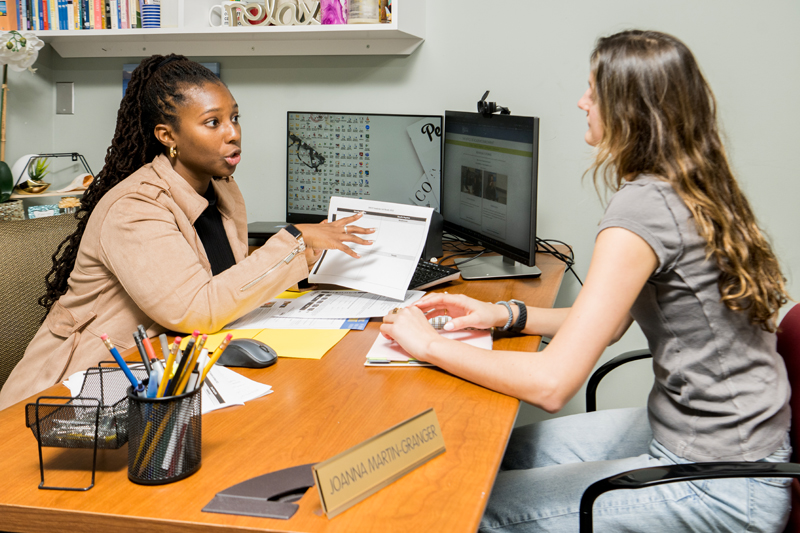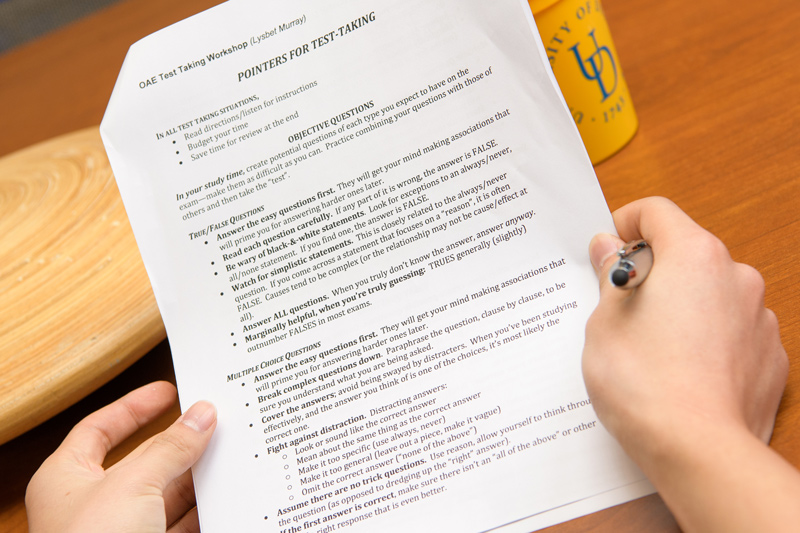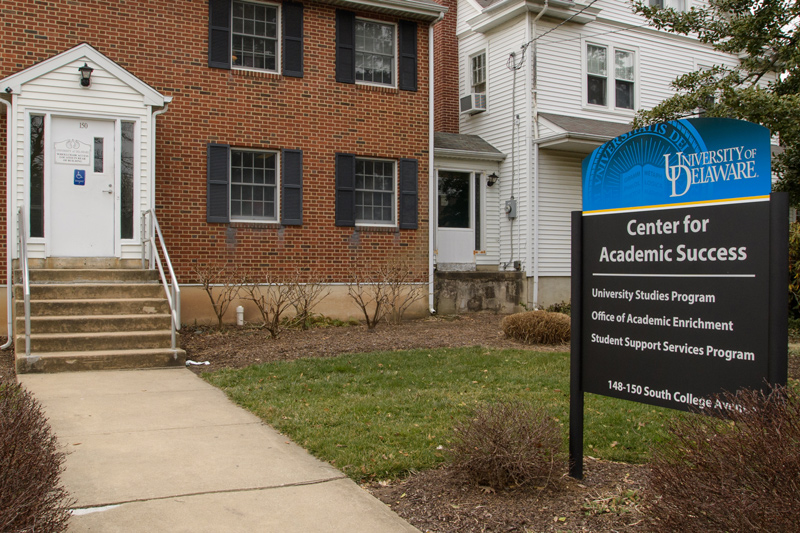


Strategies for success
Photos by Kathy F. Atkinson February 14, 2023
UD's Office of Academic Enrichment provides tips for a successful semester
Heading into her first year at the University of Delaware, Natalie Guida wanted to make sure she was taking advantage of all the resources offered to her so that she could make the most of her academic experience. Before she even began her first semester, she scoped out the Office of Academic Enrichment’s website and decided she would utilize the tutoring services and meet with an academic coach.
Those services proved to be invaluable, and she took the lessons learned and is now applying them to the spring semester as well.
“As a freshman, I didn’t know where to start,” said Guida, a marketing major. “Talking through my goals and learning how to stay organized and schedule my time was super helpful.”
The Office of Academic Enrichment (OAE) helps students develop academic skills and strategies so they can be successful. Among the offerings are individual and drop-in tutoring, skill-building classes, one-on-one coaching, review sessions and workshops — and nearly all of the services are free. All undergraduate students can benefit from the support OAE offers; struggling students can gain confidence and see great improvement, and high-achieving students can become even stronger.
Joanna Martin-Granger, one of OAE’s academic success coaches, shared time management, organization and study tips so students can set themselves up for a successful semester.
Time management
Martin-Granger said the biggest issue she sees with students is a lack of time management, which then has a ripple effect into all other aspects of student success. When the semester starts, students often feel like they have a lot of free time, but then by the third or fourth week of classes, work can begin to pile up and students can easily feel overwhelmed.

“You have to have a plan for your time. A lot of times, we just assume things will get done, but we don't really know the when and the how around that,” she said. “When it comes to time management, I always tell students, a man who fails to plan plans to fail. We need to come up with how you are going to work the time that you have, and that starts with mapping out the semester.”
Looking ahead at due dates and seeing when assignments in different classes overlap is key, Martin-Granger said. After mapping out the entire 15-week semester, students should break down their schedules on a weekly basis, specifically looking for gaps of times that can be better utilized.
A lot of students lose valuable time without even realizing it, Martin-Granger said. For example, a student may have a class in the morning, followed by a break before classes later in the afternoon. During that break, some students might opt to take a nap or hang out with friends, but by doing that, they’re wasting prime studying time.
“Students often wait until the end of the evening to do their studying, when the reality is that gap — those three hours between classes — are probably better utilized doing some homework,” Martin-Granger said. “And so we’re able to find where students are losing that time, and better utilize it. Then you could go to sleep at night, because you don't have to stay up until 2 a.m. trying to do the homework that you very easily could do in those gaps between classes.”
Staying organized
When it comes to staying organized, students need to figure out the best system that works for them, whether that’s having a paper planner or using a digital calendar to mark classes, due dates and other obligations.
“The best system is the one you can maintain,” Martin-Granger said. “For some folks, having a paper planner is their thing, they love the physicality of that — then you should do that. Don't try to go digital if that doesn't work for you. Figure out what it is that's going to be the most accessible and what's going to be the easiest way for you to maintain that system, and then you will be able to work that system best.”
Martin-Granger also advises to keep the end in mind when tackling assignments.
“I'm really big into reverse engineering things,” she said. “If you have a paper and it's due by a certain date, and your professor has already outlined all the pieces that you'll need to turn in … ask yourself, ‘What kind of deadlines do I need to impose on myself so I can get this thing done in a timely fashion so I can get that grade or I can complete it by that deadline that I want.’ Thinking about assignments with the end in mind is always really great.”
Combatting procrastination
Procrastination is a habit, not a genetic trait, Martin-Granger said.
“Procrastination is not a character flaw,” she said. “A lot of times students are like, ‘I'm a procrastinator.’ No, you procrastinate, and there's a difference. It's a habit that you've created, and you can unlearn that. It's not genetic. You're not genetically predisposed to being a procrastinator. And so because it's not something that's inherent to you, we can teach you things to help things be different for you.”

There are lots of root causes for procrastination, including fear of failure, perfectionism, fear of criticism, avoidance or trouble focusing. Martin-Granger said to identify the root of procrastination, and then address that with the help of an academic coach.
Martin-Granger also advises students not to believe the lie that they work better under pressure.
“The fact is that pressure actually just creates a sense of motivation that wasn't there before,” she said. “Try to figure out why you procrastinate, and then get some support around it.”
Study tips for success
Studying for exams begins well before students sit down to study, and most of the time students don’t realize that, Martin-Granger said. Studying can involve reviewing notes, attending a discussion session or using flashcards to stay on top of terminology.
“We really need to expand how we think about studying,” Martin-Granger said. “Studying is not just the thing you do when you go to the library with all your materials and read it in time to take a test.”
Martin-Granger recommends that students study two to three hours each week per credit hour. So if a student takes 15 credits, which is fairly average, he or she should study about 30 to 45 hours per week.
“Think full-time student, full-time job. It’s the same concept,” she said. “So you as a full-time student, that's the range in which we're expecting you to commit to your studies. And again, that goes back to expanding that concept of studying. I'm not saying that you need to be sitting down for 30 to 45 hours reading your notes, but engaging with the material external to that class time is the expectation.”
Students can begin studying before they even go to class. Professors often post their materials before a lecture or will upload their slides at the beginning of the week. Taking 10-15 minutes per lecture to preview the materials can allow students to anticipate what’s going to be discussed in class.
The next step in studying is reviewing and reformatting notes taken during class.
“This is essentially where you are going to make your notes your own and make them have meaning,” Martin-Granger said. “A lot of times students may write something down the way that the professor says it, but that's not the way you speak, and it’s not going to be the best way for you to remember it. Make it your own. Rewrite those notes so that it sounds like your own voice, and then you'll be more prone to remember them.”
Students can learn how to become better note-takers by seeing a coach or attending a note-taking workshop.
Part of the reviewing process is repetition. Martin-Granger teaches students about the Ebbinghaus Forgetting Curve, a memory model that demonstrates that people lose information over time if they don’t try to retain it. The steepest decline occurs on the first day after learning new information, which is why it’s important to review notes shortly after taking them.

As time goes on, if students continue to engage with the material, they’ll be less likely to forget the content. Martin-Granger advises against pulling an all-nighter or trying to cram before an exam, because when the exam is over, students won’t remember 90% of that information. Instead, students should distribute that learning over time. After all, Martin-Granger said, the goal of studying isn’t to do well on an exam, it’s to master the material so that knowledge can be applied in future careers.
“If somebody hands you a cheeseburger, do you swallow it whole or do you take bites?” Martin-Granger said. “Students say, ‘That's impossible. You can’t swallow it whole. You’ll choke.’ Exactly. That's what cramming overnight trying to study is like — you trying to swallow a hamburger whole. If you distribute over time, you get to take the bites, you get to actually enjoy what you're eating because you can taste it, you’re not choking on it, and it actually becomes a lot more appetizing. And so that distribution gives students a chance to actually take in what it is that they're studying.”
Taking time to unwind
In the midst of a busy semester, students need to take time to destress and rest — and rest can include things like watching TV or scrolling TikTok — but it’s important to make time for those things.
“We don't want to use hanging out with friends, socializing, TikTok — whatever it might be — as an avoidant tactic to getting the work done, but it is important to still engage in those things,” Martin-Granger said. “You have to have that downtime, but if you schedule it, then it will be more of a help than a hindrance to your student experience.”
Contact Us
Have a UDaily story idea?
Contact us at ocm@udel.edu
Members of the press
Contact us at mediarelations@udel.edu or visit the Media Relations website

